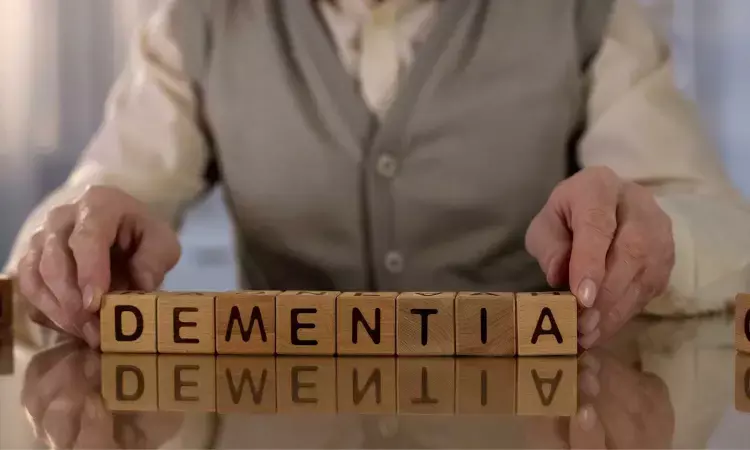- Home
- Medical news & Guidelines
- Anesthesiology
- Cardiology and CTVS
- Critical Care
- Dentistry
- Dermatology
- Diabetes and Endocrinology
- ENT
- Gastroenterology
- Medicine
- Nephrology
- Neurology
- Obstretics-Gynaecology
- Oncology
- Ophthalmology
- Orthopaedics
- Pediatrics-Neonatology
- Psychiatry
- Pulmonology
- Radiology
- Surgery
- Urology
- Laboratory Medicine
- Diet
- Nursing
- Paramedical
- Physiotherapy
- Health news
- Fact Check
- Bone Health Fact Check
- Brain Health Fact Check
- Cancer Related Fact Check
- Child Care Fact Check
- Dental and oral health fact check
- Diabetes and metabolic health fact check
- Diet and Nutrition Fact Check
- Eye and ENT Care Fact Check
- Fitness fact check
- Gut health fact check
- Heart health fact check
- Kidney health fact check
- Medical education fact check
- Men's health fact check
- Respiratory fact check
- Skin and hair care fact check
- Vaccine and Immunization fact check
- Women's health fact check
- AYUSH
- State News
- Andaman and Nicobar Islands
- Andhra Pradesh
- Arunachal Pradesh
- Assam
- Bihar
- Chandigarh
- Chattisgarh
- Dadra and Nagar Haveli
- Daman and Diu
- Delhi
- Goa
- Gujarat
- Haryana
- Himachal Pradesh
- Jammu & Kashmir
- Jharkhand
- Karnataka
- Kerala
- Ladakh
- Lakshadweep
- Madhya Pradesh
- Maharashtra
- Manipur
- Meghalaya
- Mizoram
- Nagaland
- Odisha
- Puducherry
- Punjab
- Rajasthan
- Sikkim
- Tamil Nadu
- Telangana
- Tripura
- Uttar Pradesh
- Uttrakhand
- West Bengal
- Medical Education
- Industry
Unmarried Individuals Have Lower Dementia Risk Than Married People, reports research

Researchers in a U.S. study tracking 24,000 older adults over 18 years through the National Alzheimer's Coordinating Center found that unmarried individuals had a lower risk of dementia compared to their married counterparts. The findings were consistent for both men and women. The study was published in Alzheimer’s & Dementia: The Journal of the Alzheimer’s Association by Selin K. and colleagues.
The current research employed Cox regression models to investigate the association between baseline marital status and clinically diagnosed dementia, such as Alzheimer's disease (AD) and Lewy body dementia (LBD). A comprehensive set of covariates was adjusted for, including demographic, behavioral, clinical, genetic, referral source, participation, and diagnostic variables. The analysis also examined whether marital status differed based on sex, age, and referral source.
Key Findings
• Unmarried Individuals and Lower Dementia Risk: Compared to those married, widowed, divorced, or never married individuals had a lower risk for developing dementia.
• Widowed: HR = 0.73; 95% CI = 0.67–0.79 Divorced: HR = 0.66; 95% CI = 0.59–0.73
• Never Married: HR = 0.60; 95% CI = 0.52–0.71
• Dementia Types: The protective association of unmarried status was seen for both Alzheimer's disease and Lewy body dementia and not for vascular dementia and mild cognitive impairment (MCI).
• Lower Risk for Progression from MCI to Dementia: All unmarried groups had a lower risk to progress from MCI to dementia.
The associations were marginally stronger for males, younger individuals, and individuals referred by others. The results may indicate that an initial dementia diagnosis may be delayed for unmarried individuals for reasons related to healthcare access, social support, or awareness of symptoms. Never-married, divorced, or widowed adults may be subject to a different set of social, occupational, or lifestyle factors that work towards cognitive health protection.
The study authors indicated that never-married, divorced, or widowed adults have reduced risk of developing dementia compared with married adults. These results add new knowledge on the multifaceted relationship between social variables and cognitive function, and emphasize further research on understanding how marital status affects risk for dementia.
Reference:
Dr Riya Dave has completed dentistry from Gujarat University in 2022. She is a dentist and accomplished medical and scientific writer known for her commitment to bridging the gap between clinical expertise and accessible healthcare information. She has been actively involved in writing blogs related to health and wellness.
Dr Kamal Kant Kohli-MBBS, DTCD- a chest specialist with more than 30 years of practice and a flair for writing clinical articles, Dr Kamal Kant Kohli joined Medical Dialogues as a Chief Editor of Medical News. Besides writing articles, as an editor, he proofreads and verifies all the medical content published on Medical Dialogues including those coming from journals, studies,medical conferences,guidelines etc. Email: drkohli@medicaldialogues.in. Contact no. 011-43720751


